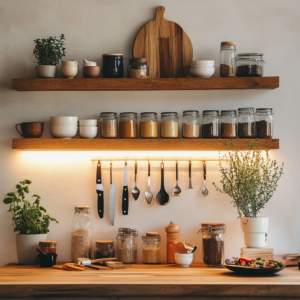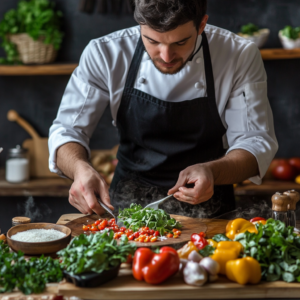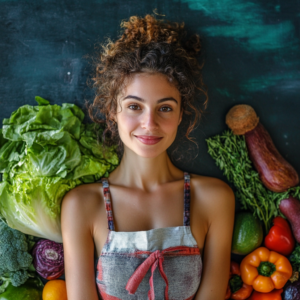Introduction
Welcome, fellow food enthusiasts! I’m thrilled to present this comprehensive guide on Mastering Vegan Cooking: Top Tips for Beginners. Over the years, I’ve discovered that developing strong vegan cooking skills not only transforms your approach in the kitchen but also enhances your overall lifestyle. Whether you’re just beginning your plant-based journey or have been exploring vegan cuisine for a while, the art of learning vegan cooking has empowered me to create meals that are both nutritious and bursting with flavor. In this guide, I share my personal experiences, expert tips, and practical advice to help you confidently navigate the world of vegan culinary arts. From essential kitchen tools and ingredients to fundamental techniques and creative recipes, every section is designed to support you as you progress in your journey toward vegan cooking mastery. If you’re interested in further exploring the benefits of a plant-based diet, you might also enjoy reading 10 Essential Vegan Nutrition Tips for a Healthier Life.
Understanding How to Excel in Vegan Cooking
Learning to excel in vegan cooking is a journey that combines creativity, knowledge, and passion. As you gain familiarity with different ingredients and techniques, you’ll discover that plant-based cooking is not about limitations—it’s about endless possibilities. Over time, I have realized that every recipe is an opportunity to experiment, innovate, and express your unique culinary style. With that in mind, let’s dive into the world of vegan cooking mastery and unlock the secrets to creating delicious, healthy meals.

1. The Importance of Mastering Vegan Cooking and Its Impact on Your Lifestyle
Developing strong vegan cooking skills is essential for anyone committed to a plant-based lifestyle. Not only does it allow you to create flavorful, nutrient-dense meals, but it also gives you control over your health and dietary choices. When you learn to excel in vegan cooking, you’re not just following recipes—you’re understanding ingredients, techniques, and nutritional principles that form the foundation of a balanced diet.
a. How Vegan Cooking Skills Empower Your Diet
For me, acquiring culinary mastery has been a transformative experience. It has empowered me to experiment with new ingredients and techniques, ultimately making my diet more diverse and satisfying. Building your vegan cooking skills means understanding how to balance flavors, textures, and nutrients to create meals that are both healthy and incredibly enjoyable. With every new recipe I conquer, I become more confident in my ability to sustain a vegan lifestyle that aligns with my ethical values and supports my overall well-being.
b. The Influence of Culinary Mastery on Health and Sustainability
The benefits of becoming proficient in vegan cooking extend far beyond the kitchen. A well-prepared vegan meal is a powerful tool for maintaining optimal health and promoting sustainability. By learning how to cook plant-based meals, I’ve been able to reduce my reliance on processed foods, lower my environmental footprint, and embrace a lifestyle that is both nourishing and eco-friendly. This culinary mastery is a testament to the fact that a vegan diet can be both sustainable and delicious, ultimately benefiting not only your health but also the planet.
2. Essential Tools and Ingredients for Excelling in Vegan Cooking
One of the first steps toward culinary success is ensuring that your kitchen is well-equipped with the right tools and stocked with essential ingredients. Having the proper equipment and high-quality ingredients sets the stage for success and makes the cooking process more enjoyable and efficient.
a. Must-Have Kitchen Tools for Plant-Based Culinary Success
When I first started, I quickly learned that the right kitchen tools can make all the difference. Here are some must-have items:
- Quality Knives and Cutting Boards: Sharp knives and durable cutting boards are essential for chopping vegetables quickly and safely.
- Blender or Food Processor: These appliances are indispensable for creating smoothies, purees, and sauces that serve as the basis for many vegan dishes.
- Slow Cooker or Instant Pot: Perfect for preparing hearty soups, stews, and curries with minimal effort.
- Non-Stick Pans and Baking Sheets: They prevent food from sticking, enabling healthier cooking with less oil.
- Measuring Cups and Spoons: Precise measurements are key to achieving balanced flavors and textures.
These tools have allowed me to tackle recipes with confidence and continually improve my skills in vegan cooking.
b. Stocking Your Pantry: Key Ingredients for Excellent Vegan Recipes
A well-stocked pantry is the backbone of any successful kitchen. I ensure my pantry is filled with versatile, nutrient-dense ingredients that form the foundation of countless meals. Essential items include:
- Whole Grains: Brown rice, quinoa, oats, and barley provide complex carbohydrates and fiber.
- Legumes: Beans, lentils, chickpeas, and peas are excellent sources of plant-based protein.
- Nuts and Seeds: Almonds, walnuts, chia seeds, flaxseeds, and hemp seeds add healthy fats and protein.
- Herbs and Spices: Turmeric, cumin, paprika, basil, and rosemary are essential for adding depth to your dishes.
- Fresh Produce: Seasonal fruits and vegetables, which are packed with vitamins, minerals, and antioxidants.
By keeping these ingredients on hand, I’m always ready to experiment and create diverse, nutritious meals that embody the essence of vegan cooking mastery.
3. Fundamental Techniques for Improving Your Vegan Culinary Skills
Once you have the right tools and ingredients, the next step is learning and refining essential cooking techniques. These methods form the foundation of your culinary expertise and help you create dishes that are both delicious and nutritionally balanced.
a. Basic Cooking Techniques Every Beginner Should Know
Several core techniques are crucial for any aspiring vegan chef. Some important methods include:
- Sautéing and Stir-Frying: Ideal for quickly cooking vegetables while preserving their color, texture, and nutrients. I often use a wok or large skillet to stir-fry a mix of vegetables and tofu for a quick, healthy meal.
- Steaming: An excellent method for cooking vegetables gently, preserving their vitamins and minerals.
- Baking and Roasting: These techniques enhance the natural flavors and textures of vegetables, perfect for dishes like roasted chickpeas or vegetable lasagna.
- Blending: Essential for creating smoothies, soups, and sauces, a high-powered blender can transform fresh produce into silky textures that serve as the base for many recipes.
Mastering these techniques has significantly boosted my confidence in the kitchen and is a vital component of my journey in vegan culinary arts.
b. Tips for Perfecting Flavors and Textures in Vegan Dishes
Achieving the ideal balance of flavors and textures is key to creating outstanding vegan meals. Some tips that have helped me include:
- Layering Flavors: Start by sautéing aromatics like garlic, onions, and spices to build a flavor base before adding other ingredients.
- Balancing Acidity and Sweetness: A touch of lemon juice or a drizzle of maple syrup can elevate a dish by balancing its natural acidity or sweetness.
- Using Fresh Herbs: Adding fresh herbs at the end of the cooking process can brighten up the dish and add a burst of flavor.
- Adjusting Textures: Experiment with various cooking methods and ingredient combinations to achieve your desired consistency—whether you prefer creamy sauces or a crunchy garnish.
These tips have allowed me to refine my recipes and truly excel in plant-based cooking.

4. Quick and Easy Vegan Recipes for Beginners
As you embark on your journey to excel in vegan cooking, starting with simple, easy-to-follow recipes can build your confidence and expand your culinary skills. Here are some of my favorite quick and easy recipes that are perfect for beginners:
a. Simple Stir-Fry with Tofu and Vegetables
This quick stir-fry is my go-to meal when I’m short on time. It combines protein-rich tofu with a colorful mix of vegetables, all tossed in a light soy-ginger sauce.
Ingredients: Tofu, broccoli, bell peppers, snap peas, soy sauce, ginger, garlic, and a drizzle of sesame oil.
Instructions: Press and cube the tofu, then stir-fry with garlic and ginger. Add chopped vegetables and cook until tender-crisp. Finish with soy sauce and a sprinkle of sesame seeds.
This recipe is a prime example of how you can create a balanced, delicious meal with minimal ingredients.
b. Creamy Avocado Pasta
This dish transforms simple ingredients into a rich, satisfying meal.
Ingredients: Whole wheat pasta, ripe avocados, garlic, lemon juice, fresh basil, and cherry tomatoes.
Instructions: Cook the pasta according to package directions. In a blender, combine avocado, garlic, lemon juice, and basil until smooth. Toss the pasta with the avocado sauce and top with halved cherry tomatoes.
A dish like this not only highlights the simplicity of vegan cooking but also shows how fresh, wholesome ingredients can be combined to create a nutrient-dense meal.
c. Quick Quinoa Salad
For a refreshing and nutritious option, I often prepare a quinoa salad loaded with vegetables and dressed with a zesty lemon-tahini sauce.
Ingredients: Quinoa, cucumber, cherry tomatoes, red onion, spinach, lemon juice, tahini, and olive oil.
Instructions: Cook quinoa and let it cool. Chop the vegetables and mix with the quinoa. Whisk together lemon juice, tahini, olive oil, salt, and pepper, then toss with the salad.
This recipe is a fantastic way to showcase the versatility of quinoa and the power of a well-balanced vegan meal.
d. Energizing Smoothie Bowl
Smoothie bowls are a convenient yet indulgent option for breakfast or a snack.
Ingredients: Frozen banana, frozen mixed berries, spinach, almond milk, chia seeds, and almond butter, with toppings like granola, coconut flakes, and fresh fruit slices.
Instructions: Blend the frozen banana, berries, spinach, almond milk, chia seeds, and almond butter until thick and smooth. Pour into a bowl and garnish with your favorite toppings.
This recipe is highly customizable, allowing you to experiment with different fruits and superfoods to create a nutrient-packed, energizing dish.
5. Overcoming Common Challenges in Vegan Cooking
Even with the best tools and recipes, beginners often face challenges when learning vegan cooking. Here are some common hurdles and strategies to overcome them:
a. Avoiding Common Mistakes in Vegan Cooking
Early on, I made several mistakes such as overcooking vegetables or using too much oil. Over time, I learned the importance of precise timing and temperature control. Some helpful tips include preheating your oven or pan, using minimal oil, and experimenting with different cooking methods to find what works best for you. Remember, practice and patience are key to excelling in vegan culinary arts.
b. How to Adapt Traditional Recipes for a Vegan Diet
Adapting non-vegan recipes can be a fun and rewarding challenge. I often take my favorite dishes and experiment with plant-based substitutes—using non-dairy milk instead of cow’s milk, tofu instead of eggs, or nutritional yeast in place of cheese. These small adjustments have broadened my culinary repertoire and demonstrated that with creativity, vegan cooking can be just as satisfying as traditional methods.
6. Tips for Meal Planning and Presentation in Vegan Cooking
Effective meal planning and attractive presentation are crucial to truly excel in vegan cooking. They elevate your dishes and make cooking a joyful experience.
a. Creative Meal Planning Strategies
I find that planning my meals for the week significantly reduces stress and ensures that I always have the ingredients needed for my recipes. By creating a detailed meal plan, I can experiment with a variety of dishes and ensure a balanced intake of nutrients. This strategy not only keeps me organized but also inspires me to try new recipes and refine my techniques.
b. Enhancing Your Plate: Presentation Tips for Vegan Meals
Presentation is key to a delightful dining experience. Simple garnishes, such as fresh herbs, edible flowers, or a drizzle of balsamic reduction, can transform your dish into a work of art. Over time, I have learned that an appealing presentation not only enhances the flavor experience but also motivates you to continue exploring creative vegan cooking methods.

7. Internal and External Resources to Further Your Vegan Culinary Journey
To continue advancing your skills in vegan cooking, I highly recommend several internal and external resources that have been invaluable in my journey.
a. Internal Resources
• For foundational insights into vegan nutrition and cooking, explore 10 Essential Vegan Nutrition Tips for a Healthier Life.
• Discover quick and delicious recipes that complement a balanced vegan diet at Quick and Delicious Vegan Recipes for Busy Weeknights.
• Learn how to prepare budget-friendly meals without sacrificing flavor by checking out Budget-Friendly Vegan Meals That Don’t Sacrifice Taste.
b. External Resources
For official dietary guidelines and nutritional research, visit Nutrition.gov and PubMed. Additionally, a highly regarded YouTube video from a trusted channel offers creative inspiration and practical advice on vegan cooking techniques.
8. Frequently Asked Questions (FAQ) About Mastering Vegan Cooking
Common Queries Answered
Q1: What is the most important skill to master in vegan cooking?
A1: Learning basic cooking techniques—such as sautéing, steaming, roasting, and blending—is essential. These foundational skills enable you to prepare a wide variety of vegan dishes and form the basis of successful plant-based cooking.
Q2: How can I make vegan recipes more flavorful?
A2: Experiment with herbs, spices, and global flavors. Layering aromatics and adjusting the balance of acidity and sweetness can transform even the simplest dish. These techniques are crucial in achieving culinary excellence in vegan cooking.
Q3: What are some quick recipes for beginners in vegan cooking?
A3: Start with simple dishes like stir-fries, salads, and smoothie bowls. These recipes require minimal ingredients and time, allowing you to gradually build your confidence and skills in vegan culinary arts.
Q4: How can I adapt traditional recipes to fit a vegan diet?
A4: Replace animal products with plant-based alternatives such as non-dairy milk, tofu, and nutritional yeast. Experiment with ingredient substitutions while maintaining the original flavor profile—this is a practical approach to enhancing your vegan cooking skills.
Q5: What kitchen tools are essential for vegan cooking?
A5: A quality set of knives, cutting boards, a blender or food processor, non-stick pans, and a slow cooker or Instant Pot are indispensable. These tools streamline the cooking process and are crucial for successfully executing vegan recipes.
Q6: How important is meal planning in vegan cooking?
A6: Very important. Meal planning reduces stress, saves time, and ensures that you have the ingredients needed to experiment with new recipes, thereby furthering your culinary skills in plant-based cooking.
9. Conclusion and Final Thoughts on Mastering Vegan Cooking
In conclusion, developing strong skills in vegan cooking is an essential journey that transforms not only your culinary abilities but also your overall lifestyle. Gaining mastery in vegan cooking allows you to create delicious, nutritious, and ethical meals that elevate your plant-based diet. Every new recipe and cooking technique you learn contributes to a healthier, more sustainable, and creatively fulfilling lifestyle. I hope this comprehensive guide on Mastering Vegan Cooking: Top Tips for Beginners has provided you with valuable insights and practical strategies to boost your confidence and transform your kitchen into a space of creativity and nourishment.
If you want to learn several recipes for delicious vegan dishes, I recommend this cookbook that was useful to me and I would like to share it with you.